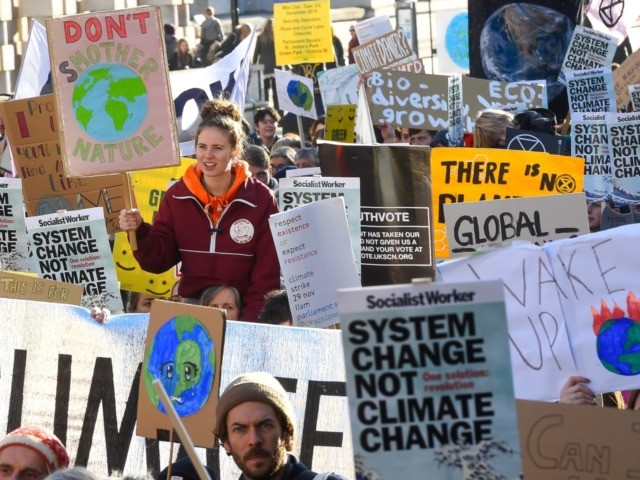The Guardian has reasserted its role as flagship publication of climate alarmism, warning Monday that entire cities in the UK could be under water by the end of the century.
Without “urgent action to adapt to and confront global heating,” the Guardian declares, Europe could face “possible forest fires, floods, droughts and deluges” by the year 2100.
Referring to a series of maps plotting possible effects from greenhouse gas emissions scenarios and climate models, Guardian writer Jennifer Rankin states that climate change could produce a one-metre rise in sea levels over the next 80 years, which would mean “90% of the surface of Hull would be under water.”
These maps of Europe predict the “scale of climate catastrophe” Europe will face, Ms. Rankin writes, which could include massive flooding of English cities such as “Norwich, Margate, Southend-on-Sea, Runcorn and Blackpool.”
As the UK battles floods, “large areas of Spain, Portugal and France would be grappling with desertification, with the worst-affected zones experiencing a two and half-fold increase in droughts under the worst-case scenario,” she writes.
Such predictions, as wacky as they may sound, are very safe to make since they cannot be verified for eighty years, giving their creators plenty of time to modify their doomsday prophecies as reality requires.
Climate fear-mongering is nothing new at the Guardian. In July 2018, the newspaper insisted that climate change is the most dangerous threat faced by the nation.
“Climate change is a greater threat to the UK than EU directives, terrorism or a foreign power invading,” wrote Simon Lewis, a “professor of global change science” at University College London.
In its commitment to stoking fear of a climate apocalypse, the Guardian has taken an ever more radical position on the climate change issue, overhauling its official lexicon and banning anything that hints of skepticism regarding the environmental devastation promised by alarmists.
Last May, the newspaper declared it would no longer speak of climate skepticism but only of “deniers,” while replacing terms like “climate change” and “global warming” with the more emotionally charged expressions “climate crisis” and “global heating.”
The Guardian’s adoption of heightened climate rhetoric followed the publication of the results of a study by advertising consultants from SPARK Neuro, which suggested that the expressions “global warming” and “climate change” do not frighten people enough. The group recommended a shift in vocabulary to “climate crisis” or “environmental collapse,” which produced a significantly stronger emotional response in a market sample.
As Extinction Rebellion (XR) spokesperson Zion Lights said on British television last October: “Alarmist language works.”
Last month, the Guardian waded still deeper into its own self-generated climate flood, this time with virtue signaling.
“The Guardian will no longer accept advertising from oil and gas companies, becoming the first major global news organisation to institute an outright ban on taking money from companies that extract fossil fuels,” the paper announced.

COMMENTS
Please let us know if you're having issues with commenting.